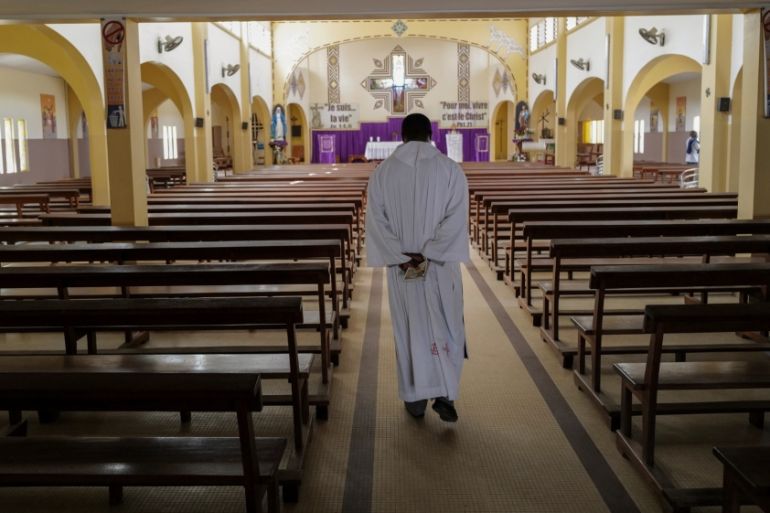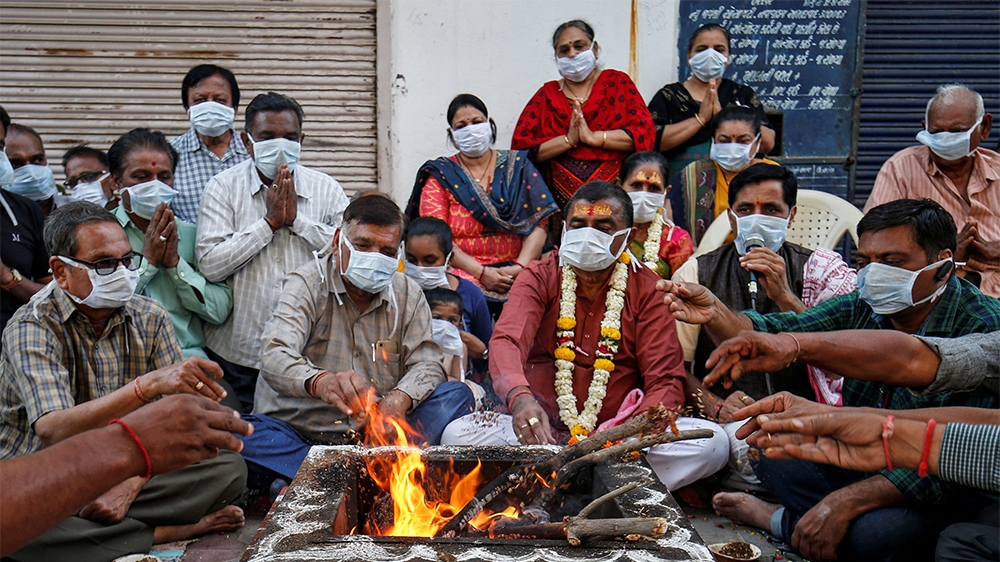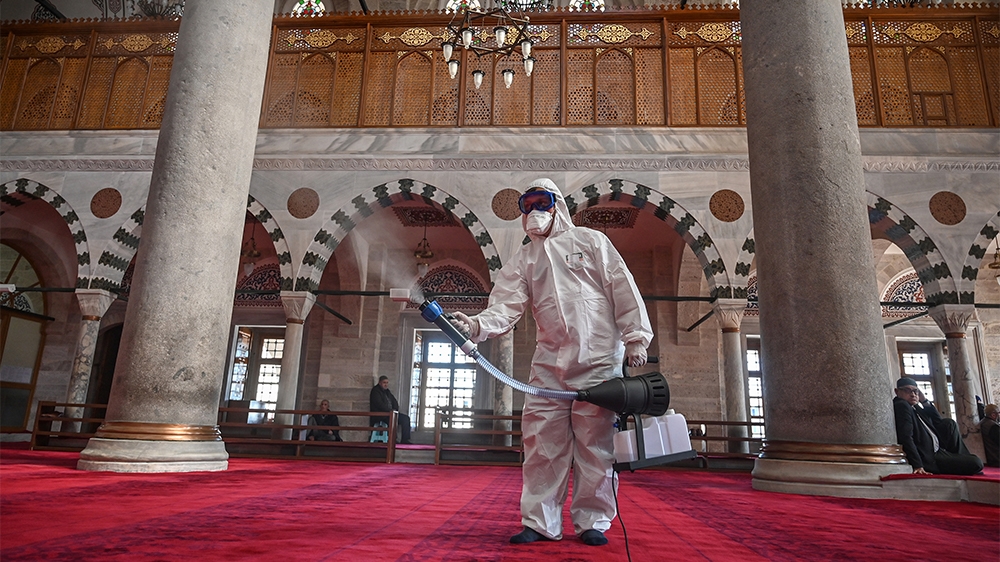Praying in a pandemic: Communal worship hard to resist for some
Many churches, synagogues and mosques have closed for the first time, but some cannot resist group prayer despite risks.

For Samuel Heilman, a visit to his local synagogue – in New Rochelle, New York in the United States – has long been part of his daily routine.
As an Orthodox Jew, Heilman considers the synagogue more than just his place of worship. It’s also a house of assembly and a house of study.
Keep reading
list of 3 itemsPrayers restricted across Middle East amid coronavirus fears
Coronavirus is changing the way Muslims worship across the world
As nations across the world implement social distancing measures, ban large gatherings and close all non-essential businesses and places to slow the spread of the COVID-19 disease, Heilman is among the millions of worshippers who can no longer visit religious sites or participate in communal prayer.
A 73-year-old distinguished professor of sociology and Jewish studies at Queens College, City University of New York, Heilman spoke to Al Jazeera while in self-isolation at home. He misses going to the synagogue and being part of communal rituals, like silent prayer and reading passages of the Torah.
|
|
“When you hear many voices singing prayer, you find your voice in the voice of others. That has the capacity to make you feel part of a body of worshipers,” he said.
“What religion offers to the solitary individual is that he or she is part of something greater than themselves. What could more demonstrate that than being with a group of other people?
“We are creatures that need to not be alone. And worship with other people has the capacity to lift one above themselves.“
Some of the world’s largest and most historic religious sites are shutting their doors for the first time.
In Europe, the Vatican remains closed, and mosques, churches, temples, synagogues and Sikh temples (gurdwaras) in the United Kingdom have begun shutting as the country catches up with mainland Europe in enforcing a stricter lockdown.
Thousands of Hindu pilgrims who perform daily rituals and visit temples in the Indian holy city of Varanasi are impacted by India’s recent nationwide curfew, as are the country’s Muslim, Jain, Sikh and Buddhist communities.
Places of worship remain shut in the Philippines, Thailand and Malaysia, where a spike in cases was linked to a recent Muslim gathering.

Across Africa, religious gatherings are being banned and places of worship are closing, including in Nigeria and South Africa, as the continent braces itself for more cases.
It’s a similar picture in South America, as Colombia implements a quarantine and as some local religious leaders in Mexico close Catholic churches and temporarily ban public Mass.
In the Middle East, Al-Aqsa in Jerusalem has been closed, along with mosques in Egypt and Jordan, while in Syria, Friday prayers were cancelled and the doors shut at the Umayyad Mosque, one of the oldest mosques in the world.
Mosques in the Gulf region are not open, and Saudi Arabia is suspending prayers and banning entry to the holy sites of Mecca and Medina.
The annual Hajj pilgrimage, which usually brings millions to Islam’s holy sites and is set for July, could also be suspended.
‘We need to be very careful’
Hyuksoo Kwon is a pastor at the Jesus Hope Church, a Presbyterian place of worship in Seoul, South Korea.
His church has been closed for the past month.
|
|
“The church is not just offering prayer; it is a community space where people come and build a relationship together with Christ,” Kwon said.
“We run weekend services, there are smaller group meetings, and on Sundays we usually eat lunch together. This has all stopped, but this is a very infectious disease and with the knowledge that we have about how fast it spreads, we need to be very careful.”
Kwon says he is monitoring the situation and will look to reopen once schools do, and when the government downgrades the threat level.
For now, the church broadcasts weekly sessions online and uses digital services like Zoom for group meetings and lessons.
“People were initially shocked at the church closing, but many people have been surprised that they can still convey feelings and emotions through the new online channels,” Kwon said. “People seem to have adapted now.”
Professor Susan Visvanathan teaches sociology at Jawaharlal Nehru University in Delhi, India.
She said the risks posed by communal gatherings, where worshippers sit near to each other and there are religious rituals requiring close physical contact, are high.
“People going to worship are also travelling in a bus or a tram and will encounter other people,” she told Al Jazeera.
“The statistics of transmission is what we are interested in. How are children and old people beleaguered by this? And should we then put experiential spaces of religious ecstasy before the safety of old people and children?”
Closures not global
The consensus around closures, however, has not been global.
Some mosques in Indonesia have reportedly ignored calls to suspend Friday prayers, and there has been a slower response in parts of Africa, including Burkina Faso, where only a small number of cases have so far been reported.
In Brazil, evangelical and Catholic churches remain open, with one church pastor in Rio de Janeiro obtaining a court order to keep the church open amid calls for smaller gatherings.
Small protests have also been reported in Iran and Senegal against the measures.

Syed Soharwardy is an imam at the Green Dome Mosque in Calgary, western Canada, and the chairman of the Islamic Supreme Council of Canada.
He is keen to keep his mosque open during this period, and has implemented a series of changes to do so.
These include having sanitisers at the entrance, offering disposable prayer mats, and requesting that women, children and the elderly pray at home. He has also reduced the communal prayer time and is staggering the sessions.
“If a healthy person is able to go to grocery stores or gas stations, they can also come to pray,” he told Al Jazeera. “Group prayer gives us a connection, some hope and some human interaction where we can speak to each other during difficult times.
“This is a real threat, and we are going above and beyond what the health experts are requiring. And while we believe in the power of medicine and in the power of our health experts, we also believe in the power of people and spirituality.”
‘Intensity of belief’
Visvanathan, the sociology professor, says this need for communal prayer is understandable because, according to some theories, the collective experience is the experience of God.
“It’s about the intensity of belief and a shared collective space,” she said. “You have the spirit of safe space that people seek out, especially during tough times, and it’s difficult to stop that.”

As the virus continues to spread, next month’s religious festivals – including Buddhist New Year, Easter, the Sikh festival Vaisakhi and the Hindu festival Rama Navami – will all be affected.
Religious leaders are now relying on technological advances to stay connected to worshippers and to continue communal prayer services during the pandemic.
South Korea’s Pastor Kwon added: “Even though it is not as lively as an actual gathering, families are watching the service online and praying at home. So we’re coping with that, and the development of the technology helps a lot.
“In the coming months, there will be some big changes socially and economically that will create cultural change. As religious leaders, we should really work hard to prevent negative values becoming core values, so this is a very critical time.”